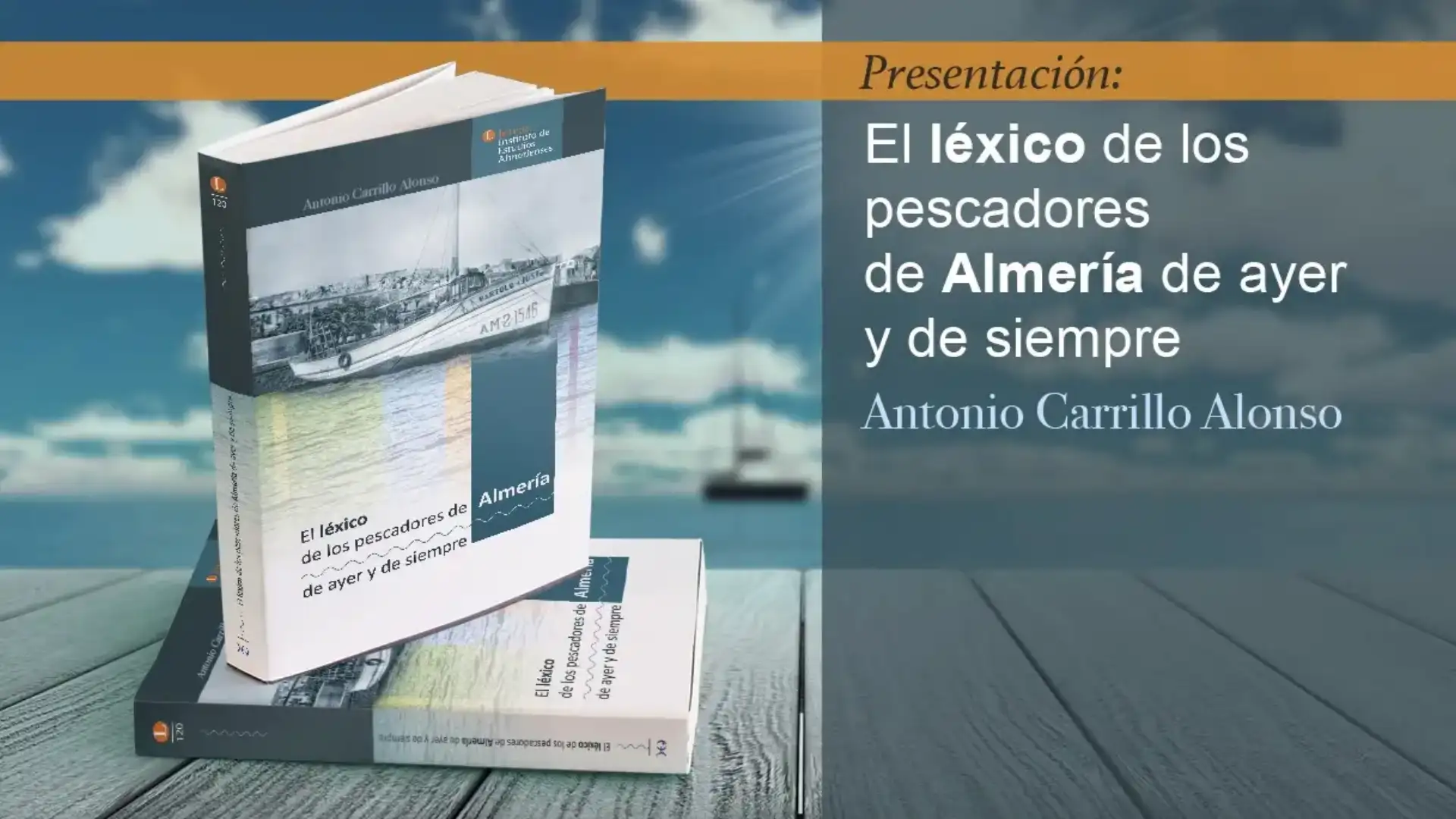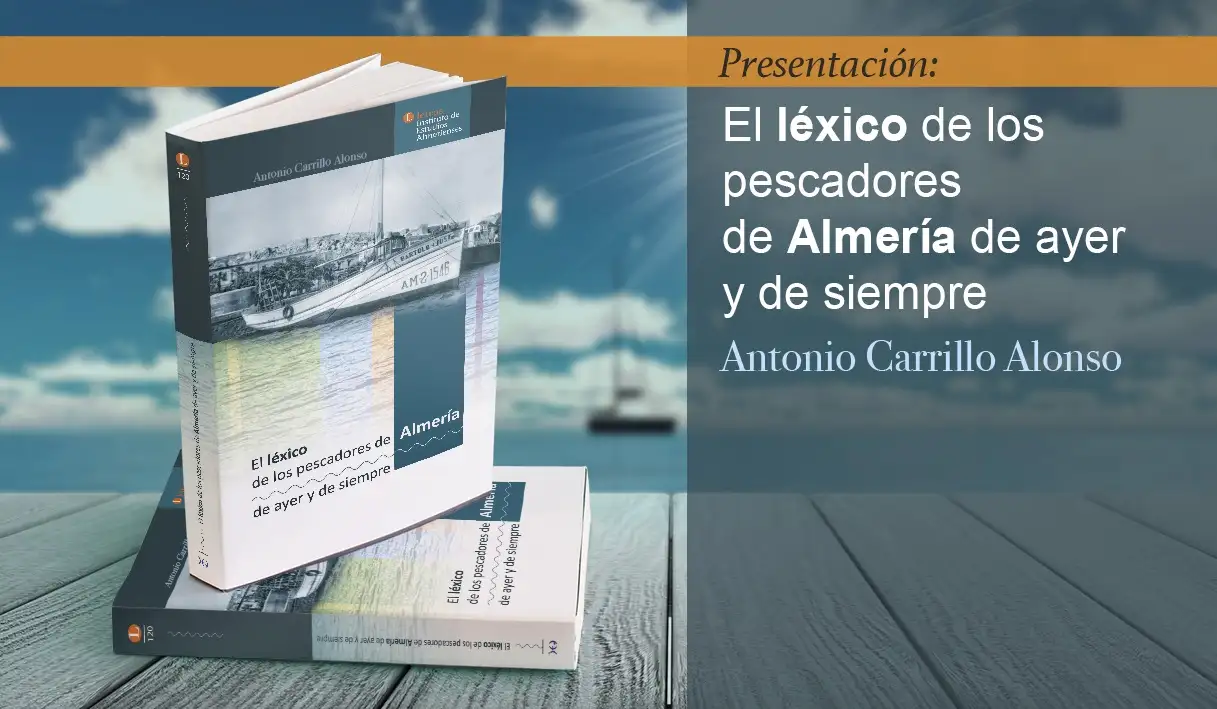
Presentation of Antonio Carrillo's work on the "lexicon of almerian fishermen"
Presentation of Antonio Carrillo's work on the "lexicon of almerian fishermen"

Antonio Carrillo Alonso, with all the sea behind him... his recent work, "The lexicon of the fishermen of Almería yesterday and always, is a rigorous, unique and differentiating contribution..." very rich linguistic inventory of the collective memory of the sailors with more than eight hundred words and phrases
The official presentation
Presentation of the Publication
The lexicon of the fishermen of Almería yesterday and always
Thursday, 12 March at 19: 30
Salon de Plenos de Diputación Provincial de Almería
WELCOMING THE WORLD
And with him all the human spirit that defines and expresses it in the word that encourages a cosmos of its own and others. In a way we baptize the world with every word we use. It is the genesis of what is created and recreated. The origin or principle of something we sing and make live with its use. And that something takes shape in the sound of the word that designates it, that makes it our own, that guides us to the meaning and sensitivity it contains and with which we dare to reverse on the lips the image that clearly comes to them to encourage us to describe it. In this pronunciation the living memory of the words forms the biography of human beings and their incipient management of language, in accordance with which facets use their work, their work, their trained and adjusted look in the rudimentary or refined, in the specialized or generic, in the intellectual or manual activity, as it is driven by the active protagonism of their exercise or mouth as circumstantial spectator attracted by the words, by their way and ademan with which they are incarnate and dynamic in the current that flows. In Romanian and ancient Slavus the word "light" also serves to designate the world, for the world is what is illuminated, what is seen. The words are lit teas with which human beings discover the consciousness and identity of the world. Thought and feeling, make and send from the leaf that is derived from the tree where wisdom made a collection with the writing in the form of a book - liber, the inner part of the bark of the arbolas - but which was before orality. That is, popular culture, survival, the resurgence of the ancestral in terms of the sacred and ceremonial. The oral tradition is birth, rite and geography of words. The footprint in the air of our traits.
THE LEXICO OF HIGH FISHERS OF AYER AND ALWAYS
The importance of this work lies in three fundamental aspects which, apart from the very scientific process that an edition of these characteristics requires, are linked with the testimony of the experiences defined on the marine continent, the unrenounced commitment to the tendon and the self-denial of some men who were discussed in it and the intellectual affirmation in the categorization of the oral tradition as immaterial vestige. Hence each word is the small intrahistory of the other one that not only transforms the professional exercise of the fishermen in their most varied facets and aspects. It is also from the environmental, landscape, climate, ornamental, gastronomic, nautical, architectural, historical, anecdotal, ethnographic, ethnic, folklore and marine biodiversity section. In sum, a compendium of the birth on the speech of the almerian fishermen, but in a certain way it is also as the author of the cosmogony that encloses the sea points out: "The fishermen have always been one of the strongest and most defined human groups in social life. They are holders of a linguistic universe full of variety and wealth, generally unknown to the rest of the speakers of the community to which they belong, because since time immemorial the distance between the world of the sea and that of" the earth "(as the sailors themselves call it) has been great."
ANTONIO CARRILLO ALONSO
The comprehensive study referred to by the Almerian teacher is not a comfortable and exclusive product of an in-use research. Nor is it as a result of the echo of third information or second informants and subsequent academic adequacy. The construction of this lexic work is a direct consequence of the vital avatar of the author himself and the resonance of his ancestors as an affective north. But, above all, as a heritage rescued from oblivion, which becomes bulwark, amparo and defense of a time when men and women attended with bold and vigorous dedication their work on sea and land, respectively, "Another important aspect in the fisherman was their role in family life. The fact that she spent many seasons outside her home - usually in the North African fishing grounds - gave women a relevant role in the family, because she was the one who really had to take care of the domestic economy and the education of her children." It is a greater question to mean this circumstance to make an adjusted correlation between the philological knowledge and the sailor who professes this work. The latter as a family descent linked to the population of Carboneras. In the introduction - of a must-read to contextualize the importance of it and to repair in the precious observation of the road of the words that we expect - this determination is imformed and based on the deep agreement that it entails, "The sources of information for the preparation of this work have been the most direct, having been fishing on family ships by the peninsular and Moroccan fishing grounds, especially during the school holidays. Hence the familiarity with this particular lexical world. This has provided us with quite a guarantee and safety for the definitions of the lexicon of fishermen, some of them difficult to specify because of the complexity that sometimes encloses the word that is defined, particularly in its differential nuances with the meaning of another term belonging to the same semantic field." This recurring appreciation reverses the fidelity between the event and the expression. While maintaining the commitment to the channel that "other authorized voices" irrigated, among them Manuel Alvar López.
THE REMINISTIONS OF THIS OBRA
Edited in December 2019 by the Institute of Almeries Studies of the Diputación de Almería, Area of Culture and Cinema, they are in the work of the author himself published in 1989 in the Bulletin of the Royal Academy of Language, under the title Lexico marinero de Almería. Its influence on other sociocultural levels. Thirty years have passed since then, in which the weight of its linguistic heritage has been seeded. Contrary to the irrendifiable purpose that the light saw over eight hundred words and phrases. Of which in a considerable percentage - approximately 70% - are not collected by the Academy. In addition, the comparative study with other publications ranging from the HispanioLatino Dictionary (Elio Antonio de Nebrija, 1495) to the linguistic and ethnographic Atlas of Andalusia (Manuel Alvar, with the collaboration of Antonio Llorente and Gregorio Salvador, 1961-1973). The publication contains a no minor trace by including a very interesting illustrative contribution with photographs - the vast majority of which correspond to the author's collection - that favour knowledge. Many of them have historiographic value as the very cover of the work. Too bad the edition did not assume, apart from the original black and white photographs, the contemporary ones, which you print in color had established for the reader visual nuances to which the care text refers. As are, for example, marine species, and more specifically those that by their likeness would require an aesthetic plus.
LEGAL OF LITERARY GOODS FOR LECTORS
The publications of Professor Antonio Carrillo have as intrinsic values the outstanding requirement of simplicity, the intellectual commitment not to escape and the honesty celebrated as discretion. These include: Towards a sociological explanation of the Flamenco. Las coplas, a collective biography (University of Granada, 1977); El Flamenco, as an expression and liberation (Almería, Cajal, 1978); Traditional poetry in the Andalusian cante. De las jarchas al canar (Sevilla, 1988, Biblioteca de la Cultura Andaluza, nº 78, con prologue de Emilio García Gómez); Gustavo Adolfo Bécquer y los cantares de Andalucía (Madrid, Fundación Universitaria Española, 1991); y Fernando de Herrera, Góngora y Soto de Rojas: su relación con la lírica arabigoandaluza (Diputación de Sevilla, 2008). They are joined by South Fishers. Orillas de Carboneras (Arraez editoras, 2013) of narrative genre, and Fishing in Almería (1900-1976). Importance of the marine families of Carboneras, Estepona and Isla Cristina as migratory points (Arráez editoras, 2017), an extensive scientific document, which together with the latter make up a trilogy, where language acquires the encrypted mystery of those men who walked over the waters like Jesus, the sailor who in South Fishers thus reflects, "the sea opens the flesh everywhere and teaches men to be men," he said. The sea that made him understand that it might be necessary for people to suffer the injustices in order to become fair (...) It would be so good to want things always with the heart. It's all we have and look at it. "A voice that rumorous discovers a lucid world of sea words.
© Pedro Luis Ibáñez Lérida
© 2024 Nautica Digital Europe - www.nauticadigital.eu











